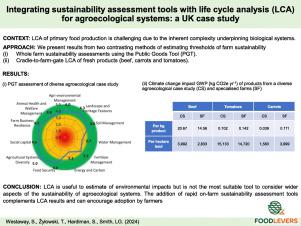当前位置:
X-MOL 学术
›
Agric. Syst.
›
论文详情
Our official English website, www.x-mol.net, welcomes your feedback! (Note: you will need to create a separate account there.)
Integrating sustainability assessment tools with life cycle analysis for agroecological systems: A UK case study
Agricultural Systems ( IF 6.1 ) Pub Date : 2024-07-01 , DOI: 10.1016/j.agsy.2024.104045 Sally Westaway , Tomasz Żyłowski , Sam Hardiman , Laurence G. Smith
Agricultural Systems ( IF 6.1 ) Pub Date : 2024-07-01 , DOI: 10.1016/j.agsy.2024.104045 Sally Westaway , Tomasz Żyłowski , Sam Hardiman , Laurence G. Smith

|
Life cycle analysis (LCA) is increasingly used to assess the environmental impacts of primary food production. As an alternative, impacts can be assessed at the farm level using holistic sustainability assessment tools. The purpose of this study was to evaluate whether an integrated approach combining a “detailed and narrow” LCA with a “broad and shallow” sustainability assessment could help integrate socioeconomic and ecosystem service evaluations in LCA by including a wide range of impact criteria. To address this overarching objective, we present results from whole-farm sustainability assessments using the Public Goods Tool (PGT), a tool developed in the United Kingdom (UK) by the Organic Research Centre, and cradle-to-farm-gate LCAs of beef, carrots and tomatoes for (i) a diverse agroecological case study farm (CSF) and (ii) a specialised agroecological production system. The use of the PGT enabled comparison with similar UK farm systems and was extended to develop biodiversity and social indices to complement the LCA. Results of the CSF demonstrated a relationship between environmental impacts and increased production efficiency, as the climate change impact per kg of product was strongly associated with higher yields, but this was less clear when impacts expressed per ha. The CSF produced less beef than the specialised system but more tomatoes and carrots, which reflects its higher labour input and less intensive production methods. The CSF generally used fewer external inputs, which decreased its overall impacts. Purchased feed contributed disproportionately to the water consumption of beef from the specialised system. PGT results highlighted the environmental benefits that can be delivered by ‘diverse’ agricultural systems and added detail to LCA results; for example the high labour input at the CSF helped generate social capital whilst partially explaining the reduced emissions from tractor operations modelled in the carrot LCA. We conclude that LCA may not be the most suitable tool to consider these wider aspects of sustainability and can only provide an estimate of environmental impacts. LCA helps understand which parts of the food system have the greatest impacts, and how they could become more sustainable, but it cannot determine sustainable agriculture alone. The addition of rapid farm-level multi-criteria sustainability assessment tools can complement the LCA results, help reveal ‘blind spots’, and encourage adoption by farmers.
中文翻译:

将可持续性评估工具与农业生态系统生命周期分析相结合:英国案例研究
生命周期分析(LCA)越来越多地用于评估初级食品生产对环境的影响。作为替代方案,可以使用整体可持续性评估工具在农场层面评估影响。本研究的目的是评估将“详细而狭隘”的生命周期评价与“广泛而浅薄”的可持续性评估相结合的综合方法是否可以通过纳入广泛的影响标准,帮助将社会经济和生态系统服务评估纳入生命周期评价。为了实现这一总体目标,我们展示了使用公共物品工具 (PGT)(由英国有机研究中心在英国 (UK) 开发的工具)以及从摇篮到农场大门的 LCA 进行的整个农场可持续性评估的结果。牛肉、胡萝卜和西红柿,用于 (i) 多样化的农业生态案例研究农场 (CSF) 和 (ii) 专门的农业生态生产系统。 PGT 的使用可以与英国类似的农场系统进行比较,并扩展到开发生物多样性和社会指数以补充 LCA。 CSF 的结果证明了环境影响与生产效率提高之间的关系,因为每公斤产品的气候变化影响与更高的产量密切相关,但当以每公顷的影响表示时,这一点就不那么明显了。 CSF 生产的牛肉比专业系统少,但西红柿和胡萝卜更多,这反映了其较高的劳动力投入和较低的集约化生产方式。 CSF 通常使用较少的外部投入,从而降低了其总体影响。购买的饲料对专用系统中牛肉的耗水量造成了不成比例的影响。 PGT 结果强调了“多样化”农业系统可以带来的环境效益,并为 LCA 结果添加了细节;例如,CSF 的高劳动力投入有助于产生社会资本,同时部分解释了胡萝卜 LCA 模型中拖拉机作业排放量的减少。我们的结论是,LCA 可能不是考虑可持续性这些更广泛方面的最合适工具,只能提供对环境影响的估计。 LCA 有助于了解粮食系统的哪些部分影响最大,以及它们如何变得更加可持续,但它不能单独决定可持续农业。添加快速农场级多标准可持续性评估工具可以补充 LCA 结果,有助于揭示“盲点”,并鼓励农民采用。
更新日期:2024-07-01
中文翻译:

将可持续性评估工具与农业生态系统生命周期分析相结合:英国案例研究
生命周期分析(LCA)越来越多地用于评估初级食品生产对环境的影响。作为替代方案,可以使用整体可持续性评估工具在农场层面评估影响。本研究的目的是评估将“详细而狭隘”的生命周期评价与“广泛而浅薄”的可持续性评估相结合的综合方法是否可以通过纳入广泛的影响标准,帮助将社会经济和生态系统服务评估纳入生命周期评价。为了实现这一总体目标,我们展示了使用公共物品工具 (PGT)(由英国有机研究中心在英国 (UK) 开发的工具)以及从摇篮到农场大门的 LCA 进行的整个农场可持续性评估的结果。牛肉、胡萝卜和西红柿,用于 (i) 多样化的农业生态案例研究农场 (CSF) 和 (ii) 专门的农业生态生产系统。 PGT 的使用可以与英国类似的农场系统进行比较,并扩展到开发生物多样性和社会指数以补充 LCA。 CSF 的结果证明了环境影响与生产效率提高之间的关系,因为每公斤产品的气候变化影响与更高的产量密切相关,但当以每公顷的影响表示时,这一点就不那么明显了。 CSF 生产的牛肉比专业系统少,但西红柿和胡萝卜更多,这反映了其较高的劳动力投入和较低的集约化生产方式。 CSF 通常使用较少的外部投入,从而降低了其总体影响。购买的饲料对专用系统中牛肉的耗水量造成了不成比例的影响。 PGT 结果强调了“多样化”农业系统可以带来的环境效益,并为 LCA 结果添加了细节;例如,CSF 的高劳动力投入有助于产生社会资本,同时部分解释了胡萝卜 LCA 模型中拖拉机作业排放量的减少。我们的结论是,LCA 可能不是考虑可持续性这些更广泛方面的最合适工具,只能提供对环境影响的估计。 LCA 有助于了解粮食系统的哪些部分影响最大,以及它们如何变得更加可持续,但它不能单独决定可持续农业。添加快速农场级多标准可持续性评估工具可以补充 LCA 结果,有助于揭示“盲点”,并鼓励农民采用。











































 京公网安备 11010802027423号
京公网安备 11010802027423号